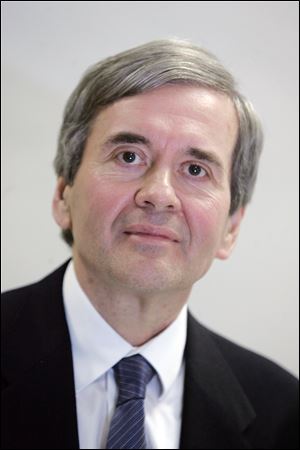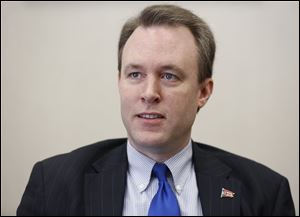
COMMENTARY
FitzGerald aims to move from ‘who?’ to ‘Governor’
4/6/2014
Kushma

Kushma
Ed FitzGerald has seven months to (1) make himself known to Ohio voters and (2) persuade them to fire John Kasich and hire him as their governor.
Mr. FitzGerald seeks to dislodge a powerful, well-financed, and relatively popular incumbent with presidential aspirations. That challenge appears difficult at best, quixotic at worst. But if earnestness in pursuit of his goal counts for something — and it should — then you might not want to bet against him just yet.
As Governor Kasich, a Republican, took office in January 2011, Mr. FitzGerald, a Democrat, became Cuyahoga County’s elected executive, a job he calls “the second biggest administrative position in Ohio.” Now he wants the top job, and in the year he’s been campaigning for it, he has developed both a cogent critique of the governor’s performance and a clear statement of the alternative he offers.
“The governor’s income tax cuts have benefited the wealthiest people in this state, while he raised other taxes on middle-class families,” Mr. FitzGerald said during a visit to The Blade last week. “His idea of making tough choices on the [state] budget has been starving local government, pushing the pain down to local communities and schools. That isn’t leadership, and these are harmful priorities for Ohio.”
As governor, Mr. FitzGerald promises to restore many of Mr. Kasich’s reductions in state aid to local governments and schools, which he says includes $100 million in Lucas County. He supports raising the federal minimum wage, or Ohio’s wage if Congress continues to balk. He notes that two-thirds of Ohio’s minimum-wage earners are women.
Mr. FitzGerald says he opposes making Ohio a “right to work” state. He takes the opportunity to cite Mr. Kasich’s support of the notorious Senate Bill 5, a state law repealed by voters that would have gutted the collective-bargaining rights of Ohio public employees.
He says he’ll broaden public disclosure of the activities of JobsOhio, the private, tax-supported — and excessively secretive — economic development corporation created by the governor, which Mr. FitzGerald says is “rife with conflicts.” He adds he wants to focus public subsidies more on helping small and medium-sized Ohio businesses to expand.

Ed FitzGerald, Democratic candidate for Ohio governor, meets with the Blade editorial board Wednesday, April 2, 2014.
“What makes the economy grow?” he says. “You can give tax breaks to those who are already doing very well, which is the governor’s approach. Or you can reduce economic inequality by raising living standards, which I favor.”
On social issues, Mr. FitzGerald says he supports legalizing same-sex marriage in Ohio, which he calls “the right thing to do.” He assails Governor Kasich for including provisions in the state budget that have greatly restricted Ohio women’s ability to exercise abortion rights.
“And he never explained why, except to say that he’s ‘pro-life,’ ” Mr. FitzGerald told me. “He hasn’t had the courage to have an open discussion. He tries to portray himself as this down-to-earth straight shooter, but he hides on issues, whether it’s women’s rights or voting rights.”
Mr. FitzGerald, a former FBI agent and mayor of the Cleveland suburb of Lakewood, says he’ll make voting rights a priority. He pledges to seek to reverse the efforts of Mr. Kasich, the GOP-controlled General Assembly, and other top state Republican officials to keep their party in power in Columbus through voter-suppression measures and extreme legislative gerrymandering.
“They know exactly who this is affecting,” he says, noting that while African-Americans account for less than one-third of Cuyahoga County residents, they represented 78 percent of the county’s in-person early voters in the 2008 election. “They talk about uniformity in voting, but that’s a straw man — uniformity does not equal the right to vote efficiently and conveniently.”
As Cuyahoga County executive, Mr. FitzGerald has battled state efforts to restrict early voting and government mailings of absentee-ballot applications. As governor, he says he would campaign for a ballot proposal aimed at imposing a fairer method of drawing political districts. By contrast, he says, “when it comes to ethics and political reform, Governor Kasich hasn’t offered a single proposal.”
Even if Mr. FitzGerald manages to pull an upset this fall, he likely would have to work with a hard-right, Republican-run legislature. Would that be a recipe for Washington-style gridlock?
“Some issues are nonpartisan,” he says. “Some things we’ll never agree on, and I’ll use my veto to protect the people of Ohio from the ill-considered things [lawmakers] pass. But I’ll look for ground in the middle where we can compromise.”
Mr. FitzGerald’s platform sounds appealing. But the separate, and larger, question is: Can he win?
He stumbled over his initial pick of a running mate, who turned out to have a massive delinquent tax bill. A poll conducted in February by the independent Quinnipiac University Polling Institute found that more than two-thirds of the Ohio voters who were surveyed didn’t know enough about Mr. FitzGerald to express an opinion about him, even after 10 months of active campaigning. Even so, the poll put him just 5 points behind Governor Kasich.
Mr. FitzGerald says that advertising is the solution to elevating his name recognition among voters, and that he expects to raise and spend enough money to compete effectively with Mr. Kasich on that score. But he concedes that he is likely to remain at a big fund-raising disadvantage, which now runs more than 5-to-1 in the governor’s favor.
“When you run state government for the benefit of a small number of people, you can raise plenty of money,” Mr. FitzGerald says. “I have a history of being outspent but still winning. I’ll have enough money for a campaign that tells the other side of the story, along with a strong grass-roots effort.”
Mr. FitzGerald is challenging Mr. Kasich to a full slate of debates, including one in Toledo (The Blade would be pleased to sponsor that event).
First, though, he must get past next month’s Democratic primary. He faces what appears to be slight opposition from Larry Ellis Ealy, a political novice and self-proclaimed civil rights activist from suburban Dayton.
“He seems like a well-meaning guy,” Mr. FitzGerald says of Mr. Ealy. “But he’s not conducting a competitive campaign, and he’s not causing us to alter our campaign plan. I’m focused on November.”
Assuming he becomes his party’s nominee, Mr. FitzGerald will continue to climb steeply uphill. For now, though, it appears that Ohio voters will have a real choice for governor in November — and a meaningful contest.
David Kushma is editor of The Blade.
Contact him at: dkushma@theblade.com or on Twitter @dkushma1